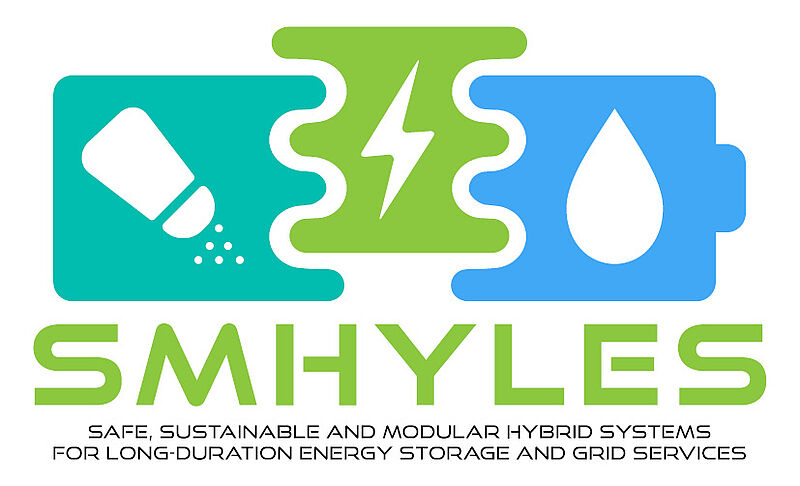
EU project SMHYLES develops novel salt- and water-based hybrid energy storage systems (HESS) on an industrial scale.
27.02.2024
Images for the SMHYLES press release
EU project SMHYLES develops novel salt- and water-based hybrid energy storage systems (HESS) on an industrial scale.
27.02.2024
Images for the SMHYLES press release
EU project SMHYLES logo
Each storage technology has technical and economic characteristics that are ideally suited for a specific application. These characteristics include, for example, energy and power density, reaction time, environmental sustainability, and safety. Redox flow and salt batteries have a large storage capacity but can only be charged and discharged slowly. A supercapacitor, on the other hand, has fast charging times but cannot store large energy quantities over a long period of time. Only the efficient combination of both functionalities provides the necessary performance and flexibility in use.
"Modern energy storage systems need to guarantee security of supply, performance and safety, have flexible management software and be manufactured and operated in the most sustainable and environmentally friendly way possible," explains SMHYLES coordinator Edoardo G. Macchi, Head of Battery and Electrification Technologies Unit at the Fondazione Bruno Kessler in Trento, Italy.
Combining sustainable batteries with other storage systems
The central goal of the SMHYLES project is to develop and demonstrate such innovative, safe, and sustainable hybrid energy storage systems on an industrial scale. In SMHYLES, a water-based supercapacitor and, either a redox flow battery or a salt battery, are to be combined to create innovative hybrid energy storage systems.
The novel hybrid storage systems developed in SMHYLES should be able to store energy over a medium to long period of time and release it very quickly. At the same time, they will reduce the use of critical raw materials, be safe to use (as they are not easily flammable), cost-effective and recyclable. Compared to conventional solutions, these new storage systems are expected to have a 40 per cent lower carbon footprint, also thanks to novel recycling solutions, and a 20 per cent higher reliability and availability, which should make our renewables-based power grids more resilient.
Demonstrators in Portugal and Germany
The SMHYLES activities include the development, construction, deployment and demonstration of an aqueous hybrid energy storage system and a salt-based hybrid energy storage system, as well as an extension of the storage duration of an existing hybrid system. During the second half of the project, various use cases will be trialled for 12 months in the three pilot plants in Portugal and Germany:
1. island grid (Portugal, Graciosa): Off-grid energy system with the installation of a nickel-carbon water-based supercapacitor and a salt battery supporting the island electric grid.
2. industrial microgrid (Portugal, Maia): Further development of a vanadium redox flow battery and combination with a water-based supercapacitor, with the aim to increase the level of renewable energy source penetration in the energy mix, as well as the electric vehicle charging support.
3. pilot plant expansion (Pfinztal, Baden-Württemberg, Germany): Capacity expansion of a redox flow battery and combination with a supercapacitor (from the EU project HyFlow) and a wind turbine; this should enable multi-day energy storage and increase grid reliability.
About the SMHYLES project
The EU project SMHYLES is developing novel salt- and water-based hybrid energy storage systems on an industrial scale. SMHYLES started in January 2024 and will run until December 2027. The project is coordinated by the Fondazione Bruno Kessler, Centre for Sustainable Energy (Italy), and is being carried out in cooperation with 15 other partners from Germany, Italy, Portugal, Switzerland, Spain, the Czech Republic, and Tunisia. The EU is funding the project under the European Framework Programme for Research and Innovation "Horizon Europe" with around €6 million. Around 630,000 euros of this budget will be allocated to Bavarian stakeholders. From Bavaria, Landshut University of Applied Sciences (Prof Pettinger, coordinator of the EU project HyFlow, a predecessor project to SMHYLES) and the Bavarian Research Alliance are participating in the project.
About the Bavarian Research Alliance (BayFOR) GmbH
During the application phase, BayFOR supported the coordinator and the consortium in the technical and content-related conceptualisation of the EU application, in the clarification of financial and administrative issues and in the formation of the consortium. BayFOR was also able to involve the coordinators of two previous EU projects (HyFlow and TwinVECTOR), which were also supported by BayFOR, in the consortium. As a funded partner in SMHYLES, BayFOR is responsible for communicating with the public and interested experts and for networking with other projects and partners.
The Bavarian Research Alliance, which is funded by the Bavarian State Ministry of Science and the Arts, advises and supports Bavarian stakeholders from science and industry (especially SMEs) in acquiring European funding for research, development and innovation. The focus lies on the EU's framework programme for research and innovation, Horizon Europe. BayFOR is a partner in the Enterprise Europe Network and the Bavarian Research and Innovation Agency.
SMHYLES profile
Project name: SMHYLES (Grant Agreement Nr.101138029) - Safe, sustainable and modular Hybrid systems for Long-duration Energy storage and grid Services
Duration: 01/2024 – 12/2027
Programme: Horizon Europe
Total EU funding amount: approx. EUR 6 million
Funding: European Union
Project coordination:
Fondazione Bruno Kessler, Centre for Sustainable Energy, Italy
Project partners:
Landshut University of Applied Sciences, Germany
Fraunhofer Institute for Chemical Technology ICT, Germany
Bavarian Research Alliance, Germany
CIRCE, Spain
SCHMID Energy Systems GmbH, Germany
C2C-NewCap, Portugal
SONICK S.p.A., Italy
Capwatt, Portugal
Capwatt Services, Portugal
Graciolica Lda., Portugal
INESC TEC, Portugal
Tomas Bata University in Zlín, Czech Republic
INDRIVETEC AG, Switzerland
RINA Consulting, Italy
Comete Engineering International, Tunisia
Press contacts
Project coordinator:
Edoardo Gino Macchi
Head of Battery and Electrification Technologies Unit – BET
Centre for Sustainable Energy – SE
Fondazione Bruno Kessler - FBK
Phone: +39 0461 314 887
E-mail: emacchi@no-spam-pleasefbk.eu
At BayFOR:
Dr Daniel Kießling
Scientific Officer ICT | Engineering & Natural Sciences
Phone: +49 911 50715-920
E-mail: kiessling@no-spam-pleasebayfor.org
MBA Gabriela Blumberger
Project Manager
Phone: +49 89 9901888-132
E-mail: blumberger@no-spam-pleasebayfor.org
Emmanuelle Rouard
Head of Unit Public Relations
Phone: +49 89 9901888-111
E-mail: rouard@no-spam-pleasebayfor.org
Funded by the European Union. Views and opinions expressed are however those of the author(s) only and do not necessarily reflect those of the European Union or CINEA. Neither the European Union nor the granting authority can be held responsible for them.







